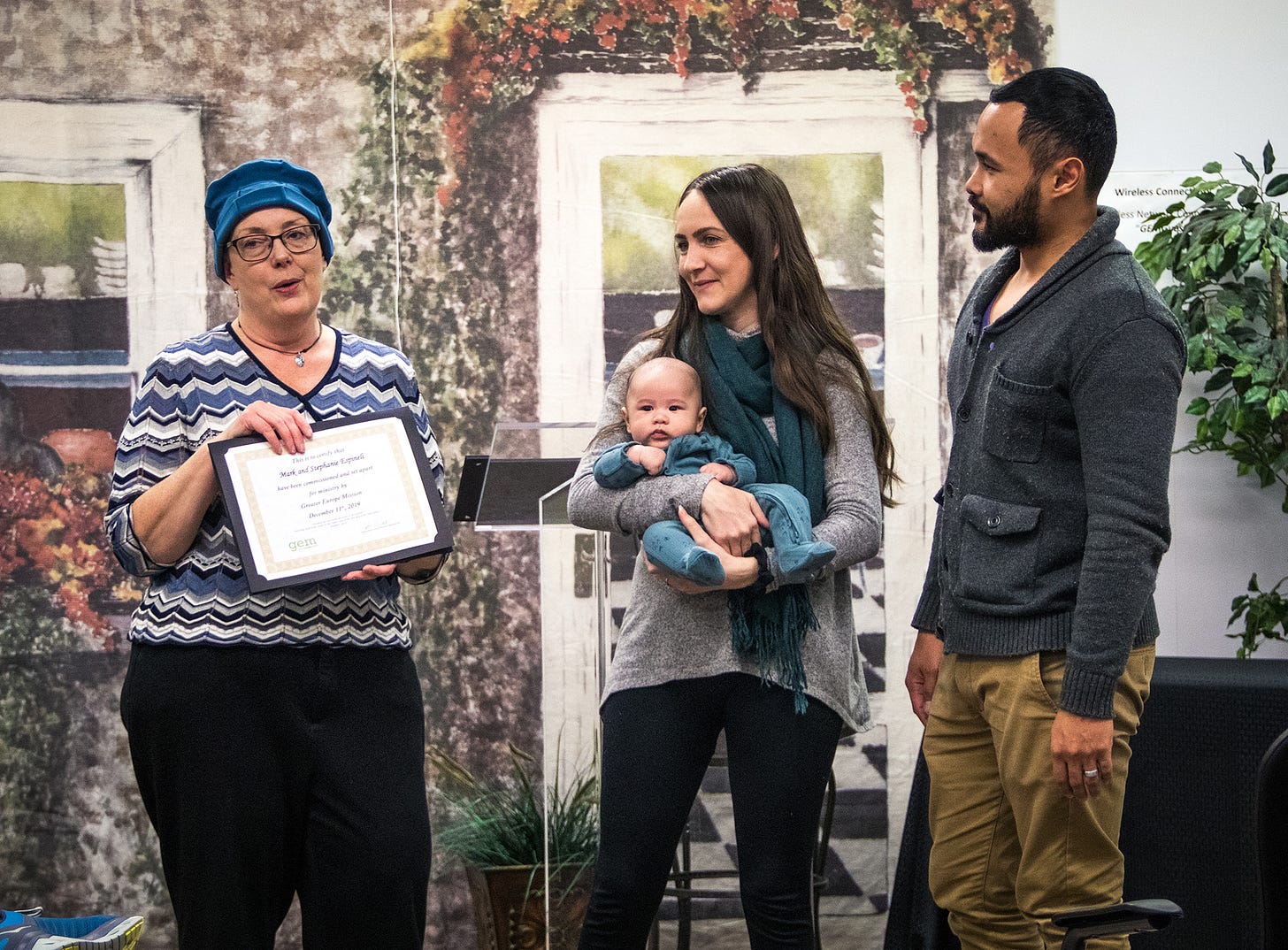If you missed the first installment of this series, check it out here. I introduced:
The starting point for every mission
Some practical ways to process and confirm calling
Factors that determine mission work
Good questions to ask a mission agency upfront
We've found it challenging to find information or insights about mission agencies and how they operate, so I'm hoping these articles will help those looking to become missionaries. We've gathered tips, pointers, and invaluable lessons along the way that will help the average person answer questions about what missionaries do.
To pick up where we left off, let's continue to build an answer to the question: What does it take to get to the mission field?
A short answer could be that it takes an entrepreneurial spirit—a drive and a willingness to work tirelessly toward the goal of launching to the field while simultaneously understanding the cost or risk of undertaking such an endeavor.
Now, let's revisit and elaborate a bit more on the "C" acrostic (alliteration) from Part One that outlines the process of discerning a calling. To go along with how a calling is confirmed, you should also consider your commitment, which will help you take courage as you work toward the field, and sustain contentment as you settle on the field.
When we were still discerning our calling to the United Kingdom, one of our mission coaches encouraged us to take inventory of our commitments by creating a priority list. The list helped us further narrow down our choice of mission agency and pathway to the field while holding onto what was most important to us.
OUR PRIORITIES
Commitment to God - the evident preeminent commitment; you'd be surprised to find how often people gloss over this and ultimately lose their bearing in the process.
Commitment to one another - Next to your commitment to the Lord—your spouse is your first ministry (along with your children).
Commitment to the place - in our case, the location we were heading to is the United Kingdom. Not every mission agency sends people to where you're called to go.
Commitment to the type of ministry - this could be charitable work in impoverished places, church-planting (starting a new church), helping an existing ministry, or pioneering your ministry based on the need.
Commitment to the agency - plenty of career missionaries stay with the same agency for decades. There are hundreds of mission agencies you can choose.
Others may organize these priorities differently, especially commitments 3-5, but the point is it will help you discern and distill the way forward. Once you've gotten further clarity, you'll move to the next step of the process, which involves a whole assortment of application forms, assessments, and various other procedures.
Preparing for the Field
Each agency you engage with will have an extensive application process. You'll have an initial phone/video call with a Mission Mobilizer or Mentor after completing a "get to know you" form. They'll want to hear your testimony (story of conversion), help discerning your specific calling, and ask about your background and ministry experience. The meeting will help you express the why behind your aim to go on mission in a particular area of the world. If both parties decide to move forward, you will then be required to fill out other application forms and extensive questionnaires that get into the nitty-gritty of your theology, philosophy of ministry, approach to evangelistic scenarios, family background, etc.
Sending Church
Your church will recognize your call, which should coincide with an ongoing capacity of ministry in the local context. They will take responsibility for you and your family while you're on the field, usually helping fund the mission and offering ongoing support such as prayer, communication, and logistics. Missionary units (individuals, couples, or families) typically have one main sending church, but some have other churches as ministry partners. Here are some helpful questions to ask yourself:
Can your church confirm your calling and vouch for your character?
Can your church acknowledge your history of involvement in the life of the local community?
Assessments
The various assessments that an agency administers can include tests like The Birkman Method and Myers-Briggs to gauge your personality profile, which will help the agency gain insights into how you work individually and collectively on a team. These tests identify our innate tendencies, how we resolve conflict, and our specific interests. If you're married, you will most likely undergo a prepare and enrich assessment as a couple, which will gauge your strengths and weaknesses in 11 relationship areas. There are four results or types of relationships: vitalized, harmonious, traditional, and conflicted. Lastly, the Bible assessment will involve a proctored exam to gauge your familiarity and understanding of the Old and New Testaments. When we're talking about a place like Europe and the UK, there has been a sharp decline in biblical literacy, so having a solid base of biblical knowledge is vital.
Candidate Orientation
Most mission agencies will have 1-2 week-long orientation events scheduled periodically throughout the year or on an as-needed basis. Some will offer a hybrid in-person and online model, but most will require that you and your family take a trip to attend on location. Orientations are held in the State where the organization has its headquarters, so if you're from California, you'll have to fly to places like Colorado, Texas, Florida, Illinois, Massachusetts, etc. Agencies will offer a reduced cost for room and board and sometimes provide other accommodations like meals in the morning and afternoon.
Much of the experience will be about interactions with leadership, staff, and other missionaries and a cohort of candidates in formal and informal settings. You'll experience various presentations, workshops, training, and other meetings. Throughout the orientation, we regularly met with HR, member care (licensed MFTs), and a discernment team, all of which collaborated to compile a list of recommended pre-field assignments and prerequisites if appointed. Much like drinking water from a firehose, it's a lot of information to take in and absorb, even when sessions are spread out evenly throughout a week.
During the last 2-days of our candidate orientation, we did an extensive boot camp on raising financial support. Since this was our first stint in full-vocational ministry, we anticipated this part of the orientation the most. Throughout the week, many seasoned missionaries with varying years of experience on the field offered brief allusions about support schedules and launch budgets and how it would take a work of the Lord to raise that many funds for the mission. A support schedule is the amount you need to raise to sustain ministry on the field, whereas the launch budget is a one-time fund you need to raise to get to the field: visa fees, plane tickets, vehicle fund, shipping belongings, etc.
The prep leading up to the boot camp required us to do 27 hours of modules on SRS (support raising solutions) Online. We were also required to read "The God Ask" by Steve Shadrach.
Member Care interviewed us individually and collectively while discussing our questionnaires and presenting us with assessment results.
Mission agencies will accommodate children by offering childcare during the orientation if you have children. If you're a young family with a nursing baby, like we were at the time, an agency will permit each parent to trade-off attending sessions while the other looks after the child.
(Photo above in memory of Suzy Penner, an inspiration to so many!)
Lessons Learned during Support Raising
Setting goals that seem impossible and sticking to them will drive you often to your knees in prayer and lead you into a deeper trust in the Lord to do what only He can. Some set timelines of 90 days or six months to raise their monthly support and launch budget.
Get a small group of people around you to regularly check in with you, hold you accountable, and intentionally intercede for you about your goals, upcoming meetings, and even during meetings with potential ministry partners.
Make use of CRM like HubSpot to stay organized. This software will help you schedule meetings, set reminders, and maintain good two-way ministry partnerships.
Many missionary units make appeals to individuals, couples, families, and churches. We've found that local businesses owned or operated by Christians are an untapped resource with tax incentives to make annual charitable contributions.
Although finding alternative means of raising financial support is difficult, you may want to devote some time to searching for and making applications for one-time grants offered by charitable foundations that align with your mission.
Scott Morton surveyed 100 Navigator Staffers, totaling 7,800 appeals (meetings). He asked how many appeals led to financial support/ministry partnership. When they spoke to a group, such as during a Sunday service or small group gathering, only 9% became financial supporters. When they wrote letters to individuals, it was 14%, and if they followed up with a phone call, that figure grew to 27%. Surprisingly, if they had a face-to-face meeting, 46% became financial supporters.
You may find that many do not make any charitable donations to any church, non-profit organization, or charity. It's been an opportunity for many of our ministry partners to think beyond their own needs and engage in funding humanitarian work (practical needs) and the Great Commission. There are those who are sent and those who send. Not everyone is called to move to another country and do this type of work, but those who are not can still partake in it by being a part of a team who sends.
The process has continuously humbled and stretched us, and we have learned more about God's economy and what it means to surrender our every need to him. We're constantly reminded that the resources are all his, and we're encouraged to see him move through those we go to in humility to participate in something bigger than ourselves.
Funding Humanitarian Work?
One of the critiques we often hear is that mission work requires fundraising. This criticism often fails to recognize that fundraising occurs in many other fields such as…
Subscribe to get access to the rest of the Funding Humanitarian Work? section, as well as the Other Prerequisites and Visa Expanded sections below! You’ll also find a short preview to Part III of this series at the end.





